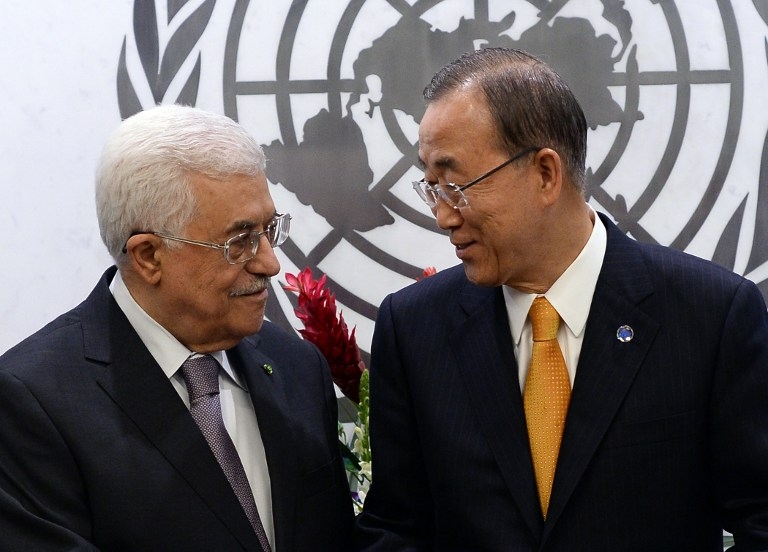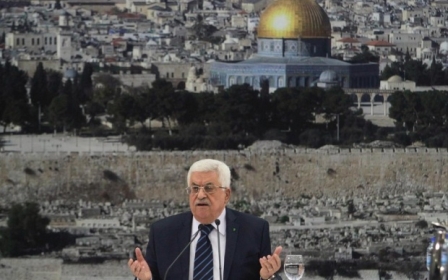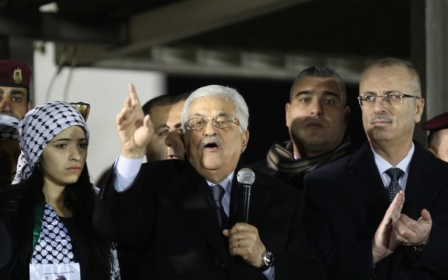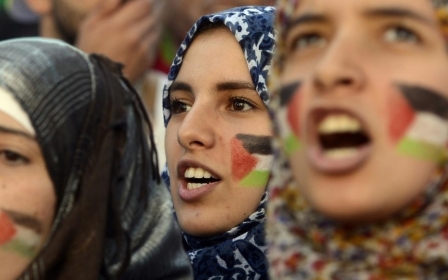Palestinians join ICC despite US opposition

The Palestinians formally joined the International Criminal Court on Wednesday in a move that would allow them to lodge war crime complaints against Israel as of April.
The decision drew fresh opposition from the United States, which argued that the state of Palestine should not be allowed to join the ICC as it is not a "sovereign state."
UN Secretary-General Ban Ki-moon accepted the request from the state of Palestine to join the ICC and said the court would be able as of 1 April to investigate serious crimes committed in the Palestinian territories.
Sidiki Kaba, the president of the assembly of state-parties to the ICC, welcomed Palestine as the 123rd signatory of the Rome Statute, which governs the ICC.
"This is a historic day for the Palestinian people," chief Palestinian negotiator Saeb Erakat told AFP. "This marks the end of Israeli impunity."
Erakat said ICC membership for the Palestinians "changes the balance of power in favour of justice, freedom, peace and international law."
But the United States, which is not a member of the ICC, questioned the decision.
"The United States does not believe that the state of Palestine qualifies as a sovereign state and does not recognise it as such and does not believe that it is eligible to accede to the Rome statute," said US State Department spokeswoman Jen Psaki.
It remained unclear, however, what recourse Washington would have to block the decision endorsed by Ban and the ICC's assembly president.
In a statement posted on the ICC website, Kaba welcomed Ban's decision and said "each ratification of the Rome Statute constitutes welcome progress towards its universality."
Palestinian leader Mahmud Abbas signed requests to join the ICC and 16 other conventions on 31 December, a day after the Security Council failed to adopt a resolution paving the way to full statehood.
In response, Israel retaliated by freezing some $127 million in tax revenue due the Palestinian Authority and the US Congress is threatening to withhold $440 million in aid.
ICC to look at Gaza 'war crimes'
The Palestinians have asked the ICC to look into possible war crimes committed during last year's Gaza war that killed nearly 2,200 Palestinians.
The Palestinian envoy to the United Nations, Riyad Mansour, said a suit could also be filed at the ICC over the construction of Israeli settlements in the Palestinian territories.
The Palestinians were upgraded from observer entity to UN "observer state" in 2012, opening the doors for them to join the ICC and a host of other international organisations.
The move is part of a Palestinian strategy to internationalise their push for statehood, moving away from US-led negotiations that have been the framework for the peace process for decades.
An Arab-backed resolution on ending the Israeli occupation by the end of 2017 was rejected at the Security Council last week, but the Palestinians are considering another measure at the 15-member council.
The United States and Australia voted against the resolution, but China, France and Russia were among eight countries that voted in favour, just one vote short of the nine required for adoption.
The United States can block any resolution at the council by resorting to its veto, but such a move could undermine US standing in the Arab world at a time when Washington is battling Islamists in Iraq and Syria.
Five countries seen as having a more pro-Palestinian stance began their term at the Security Council this month, providing a new opportunity for the Palestinians to seek support from the powerful body.
Angola, Malaysia, New Zealand, Spain and Venezuela started their two-year stint, replacing Argentina, Australia, Luxembourg, Rwanda and South Korea.
The Palestinians' next step at the United Nations is to be discussed at a January 15 Arab League meeting in Cairo.
Middle East Eye propose une couverture et une analyse indépendantes et incomparables du Moyen-Orient, de l’Afrique du Nord et d’autres régions du monde. Pour en savoir plus sur la reprise de ce contenu et les frais qui s’appliquent, veuillez remplir ce formulaire [en anglais]. Pour en savoir plus sur MEE, cliquez ici [en anglais].




